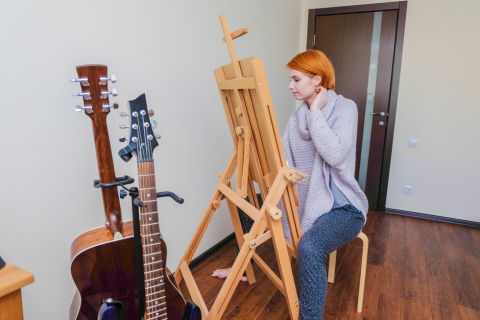
It’s tempting to believe that our passion—our “thing”—is something we should intuitively know about ourselves (hey – it makes a great storyline!). But how will this impact your college student as they head off to school this year? Will they see college as an opportunity to explore a variety of interests or will they feel pushed to discover their mysterious and unknown pre-existing passion?
If your college student sees their college journey as a race to find their “thing” and then to commit to it indefinitely–you might want to talk with them about this notion. Very recently, I’ve written about the importance of allowing young athletes to explore a variety of sports and interests, as this supports healthy identity development. The same principle applies to our “big kids” heading off to college. College kids benefit from exploring new ideas before committing to a major and potentially, a career. Yet there is a tremendous push for them to find their pre-existing passion and commit to it.
It might also help to talk about how changes in interests are also a very normal thing during the college years. About one in three students change their major in the first three years of college–with about one in 10 switching more than once! And even after college, about half of people change jobs every one to five years. Perhaps your “big kid” would benefit from talking about this with you now, before they set out for that first big step toward adulthood!
 In addition to potential issues with identity development, recent research has found that our beliefs about passion can influence our response to challenges and obstacles in everyday life. Thinking of our interests as something mysteriously buried within us is correlated with the assumption that our motivation is unlimited. When we make this assumption, we often experience difficulty coping with and overcoming obstacles. Instead, when we think of interests as something we grow, obstacles are easier to see as an expected part of our journey towards growing our passion.
In addition to potential issues with identity development, recent research has found that our beliefs about passion can influence our response to challenges and obstacles in everyday life. Thinking of our interests as something mysteriously buried within us is correlated with the assumption that our motivation is unlimited. When we make this assumption, we often experience difficulty coping with and overcoming obstacles. Instead, when we think of interests as something we grow, obstacles are easier to see as an expected part of our journey towards growing our passion.
 The bottom line: despite messages to the contrary, young people need to explore, discover, and grow their interests rather than discover their hidden passion. Our beliefs and expectations about our interests can change how we feel and respond to situations in our lives. Within the next few months, I will be offering small group, interactive online workshops for moms covering a variety of topics about the college transition. Please sign up for my newsletter to stay updated and also feel free to contact me directly to learn about my workshops and coaching in this area!
The bottom line: despite messages to the contrary, young people need to explore, discover, and grow their interests rather than discover their hidden passion. Our beliefs and expectations about our interests can change how we feel and respond to situations in our lives. Within the next few months, I will be offering small group, interactive online workshops for moms covering a variety of topics about the college transition. Please sign up for my newsletter to stay updated and also feel free to contact me directly to learn about my workshops and coaching in this area!
Contributor Statement: Melissa Santos (melissasantos@alumni.stanford.edu) contributed to the research and writing of this blog. Melissa currently works as a psychology lab manager and is preparing to apply for graduate programs in child development.
